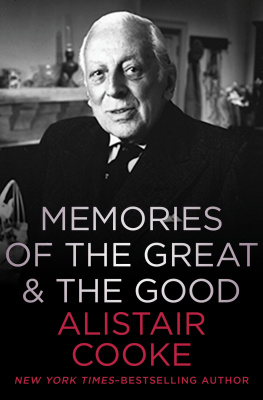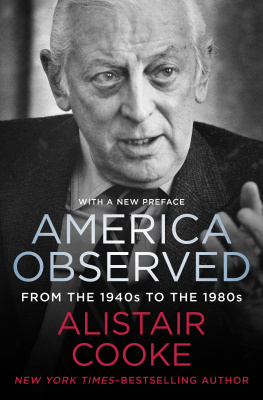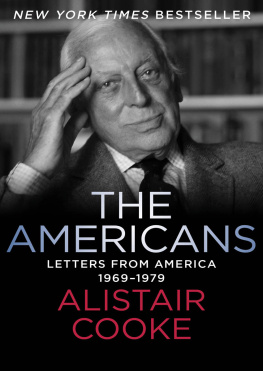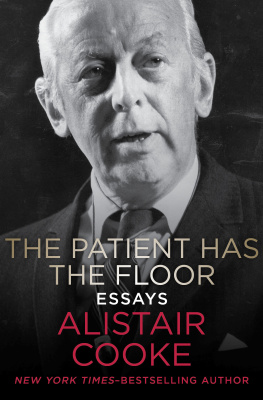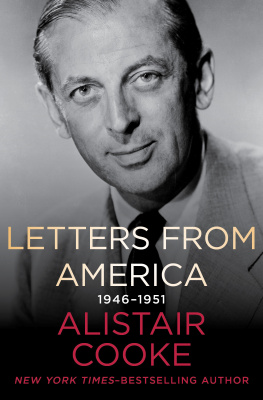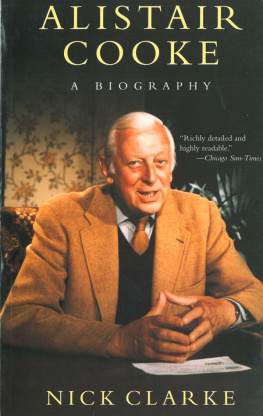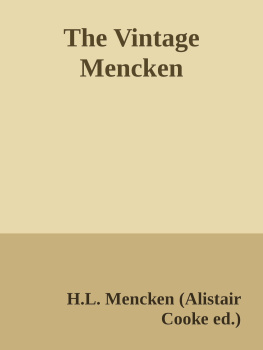TO THE READER
The great and the good is a happy phrase that takes in a general appreciation of some people who are great at one thing and other people whose character is the fascinating thing about them.
The only other point to make about the definition is that a great man or woman is not necessarily a good man or woman. Napoleon was unquestionably a great man and in some conspicuous ways a human monster. There is no need to tease the distinction further for the purpose of this collection, which is to celebrate a variety of well-known people I have met, known, covered, admired or liked throughout sixty-odd years of journalism. Most of these pieces tend to find, and rejoice in, what is best about their subjects.
Many years ago, I should say shortly after I left Cambridge at the age of twenty-three, I swore off what had been a great fashion among those of us with literary ambitions: the belief, practiced to this day by the intellectual wolf pack of London, New York, and Rome, that the business of literary and historical criticism is the cutting down to size of the famous, of the eminent dead in particular. My temperament was unhappy with the clinical scrutiny of I. A. Richards, then the helmsman of the New Wave in English studies at Cambridge. Too often, it seemed to me, he was determined to discover in a literary work what was phony or meretricious rather than what was admirable. So, I suppose, I can be said to have lapsed into the tradition of Sir Arthur Quiller-Couchs appreciative criticism, which Dr. Richards and his pupil William Empson (the first deconstructionist) came along to ridicule and supplant.
There is another prejudice, or post-judice rather, that may have conditioned my choice of heroes and heroines. For many years, my reading has been mainly in biography and in American and British social and political history. And in the past quarter century or so, I have grown increasingly weary of psychobiographies and, even more, of pornobiographies. It is only very rarely (as, for instance, in the biographies of Presidents Cleveland and Clinton) that a persons sex life is crucial to his or her public reputation or performance. Otherwise, erotic probing is simply titillation and pruriency, two words that appear to have vanished from the language of criticism. Even some of the most distinguished biographers today seem plagued by the itch to pry into the sexuality, preferably kinky, of their characters. The plague has passed this book by.
What has made this collection a pleasure to put together is the fact of my having been for all my sixty-odd active years of journalism a foreign correspondent, and for thirty years or more having the privilege of roaming at will around every region of these United States. A foreign correspondent enjoys one or two advantages not given even to distinguished journalists who specialize in one field: labor relations, city hall, the Supreme Court, a sport, and so forth. First is the chance of acquiring what Theodore Roosevelt called the sense of the continent. And the great reward of the foreign correspondents trade springs precisely from that freedom to rove around a whole continent. It is the opportunity to meet all sorts and classes of humanity in their native habitat. Had I but life enough and time, I could fill another book with a Dickensian-size cast of memorable unknowns of the greatest variety, whose daily lives I came to look into. Casually now, and at random, I recall soldiers and sailors of every rank, small businessmen of great imagination and comicality, a minor gangster forging U.S. graded beef, a burlesque stripper, a Texas sheep sluicer, a modest, illiterate boy from the Carolinas with a genius for leadership in deadly situations in the Second World War.
Only when I had retired from wandering around America did I make the surprising discovery that the friends of my own friends, and of professional people in general, were invariably people who shared their political prejudicesa drastic method of cutting yourself off from enjoying at least half the human race!
The last two profiles, of Churchill and Bobby Jones, are set apart because I am more certain of them than of the rest (without offense of judgment) that one truly embodied greatness and the other goodness.
Some of these pieces, as the acknowledging note will testify, were originally daily dispatches to my only paper, the (then) Manchester Guardian. Five of them are the scripts of radio talks done over the BBCs World Service in my weekly series, Letters from America. I had written so many thousands of words about President Franklin Roosevelt, from my first White House press conference in 1937 to his funeral at Hyde Park in 1945, that it seemed best to start again and write a new piece focused entirely on one aspect of him, and that the most vividly memorable to me. The same is true of Churchill. When the late William Shawn invited me to have my definitive say about the great man, I employed William Manchesters splendid biography to do so, and that piece, a little expanded, is included here much as it first appeared in The New Yorker. The Jones piece was written as the introduction to Martin Daviss recent anthology, The Greatest of Them All: The Legend of Bobby Jones.
I cannot end this note without expressing heartfelt gratitude to three people in particular who helped me at a difficult time during the making of this book. First, to my wife Jane, the rocklike, ever-present nurse, companion, best friend; to my publisher, Richard Seaver, for his sainted patience throughout an anxious summer; and, as much as anybody, my secretary, Patricia A. Yasek, whose devotion, tenacity and indestructible cheerfulness under the most trying circumstances made the book publishable in this century.
A.C., Summer 1999
The Scene: A small conference room in Broadcasting House, the headquarters of the British Broadcasting Corporation, in London.
The Time: The spring of 1935.
The Cast: Sitting around a semicircular formation of long rectangular tables were half a dozen or more very eminent men, assuming postures of confidence and relaxation by which men of equal eminence signify that none of them needs to be impressed by the others. Smoking cigarettes, legs crossed or outstretched, exchanging small talk amiably on one elbow. Modest, not a show-off among them. All, apparently, waiting for the chief or the president, the chairman or whoever.
The roly-poly, merry, bespectacled William Temple, Archbishop of York; Sir Johnston Forbes-Robertson, a regal presence, the last survivor of the Victorian heyday, when an actor was recognizable at a hundred paces; the renowned biologist Julian Huxley, representing Science; Logan Pearsall Smith, a dapper old American expatriate, fashioner of exquisite prose, representing (I suppose) belles lettres, which in the early 1930s was still, in England at any rate, a going profession; and C. K. Ogden, representingprobablyBasic English, for it was unlikely that he had been chosen to serve as the author or explicator of The Meaning of Meaning, a writhing thesis that nobody cared to have unraveled, not anyway at these meetings. I cant recall now who else was present to represent which of the other arts and sciences. But leaning over a sheaf of papers was a porcine, affable man with clean-shaven jowls. Not, in such company, an equally eminent man but in his own circle, which was that of linguists and phoneticians, a giant: A. Lloyd James, professor of phonetics at the University of London. He was here as the secretary of the board or committee. And what was I, an unknown beginning journalist in his mid-twenties, doing in this assembly of magnificoes? I was just back in England after a two-year stint of graduate work (and play) in the United States. The second year of my American fellowship had been spent at Harvard working under Professor Miles L. Hanley (an American Henry Higgins at the time) on the history of





